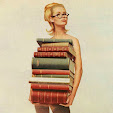My rhetoric teacher assigned us a short essay on our biggest influences in reading and writing. This is mine.
"I am writing a book which will be read by thousands, or, I modestly hope, by tens of thousands. So, please, get out of the room. I want to be alone. Writing normally calls for some kind of withdrawal." --Walter J. Ong
My parents tell a story about a time when they found me, at age two, sitting in my bed with a copy of “The Nose Book,” flipping the pages and reciting to myself the words I remembered them saying. While I didn’t get them all quite right (the words, that is), it was apparent that I had inherited Mom and Dad’s love of reading.
My childhood was lived in our apartment, at the park, and at the Fremont Public Library, with the round reading room, and that book about the chameleon who got trapped in a pickle factory. Some nights, my mother would tell us stories about a little girl named Annie, and her magic hat that could temporarily transform her into anything in the world. She didn’t have a choice as to what she would become, but she could always take the hat off and return if things got hairy.
My life was filled with literature from the day I was born.
While my tastes grew from The Nose Book to The Baby-sitters Club to The Top 500 Poems (ed. William Harmon), my own authorial instincts grew. I wrote short stories (about kittens), began novels (about mermaids), and composed poems (about camping equipment and summer storms). I think I always saw myself as a writer. But in 8th grade, Mrs. Monroe once scribbled a line or two of praise on a poem I had done for an assignment. And suddenly, with that one line, I wasn’t just a writer to myself, I was a writer to the world!
So I kept writing. I organized a binder for all my poetry, and add to it at least monthly. I became a religious journaler, and my collection of journal volumes is still growing. I started a blog [this one!] as a simultaneously more public journal, where I can also publish poems and the few short stories I attempt (mostly so that James or Valerie Best will read and critique/validate them). A year ago, I began a short novel, but, true to the cliché, have tabled it until further notice.
I saw Mrs. Monroe a year after I graduated high school. I was working at Staples; she was buying pencils. I told her I was going to major in Theatre Education. She smiled. “I always thought you’d be a writer.”
I guess I still can be.






4 comments:
i love this. i love love love this. i get so irritated when people tell me they could never be an english major "because they don't like writing papers." but what about your own life? your own stories? THEY'RE SO IMPORTANT! thank you, liz :)
You guess you can be? I guess you are! You are one of a few people I read that has such a distinctive voice ... that "Liz" voice I love. I'll look forward to reading your work all my life. And, I'm glad anything I've done when you were little provided some inspiration. Love you! Mom XOXOXOXOXOXO
Oh crap, I don't know if you want to encourage me to comment on anything. I already overstep my bounds too much. Someone handing me a story or a poem is like an open invitation to workshop. I'm trying to learn to shut up.
Well, I'm flattered. I love to see the progression of your work. That is sort of a special thing about a blog. Thanks for thinking of me and Val. (Who is a much better critic than me but I'd never tell her that.)
I think that this brandilyn character is right. There seems to be an innate desire to tell one's own story. It's got to be that, I think, before anything else, that sits someone down in front of a notebook or a laptop (or, if you're Jessica Fletcher, a typewriter). The desire to make sense of your experience.
Thanks for the shout-out.
Post a Comment